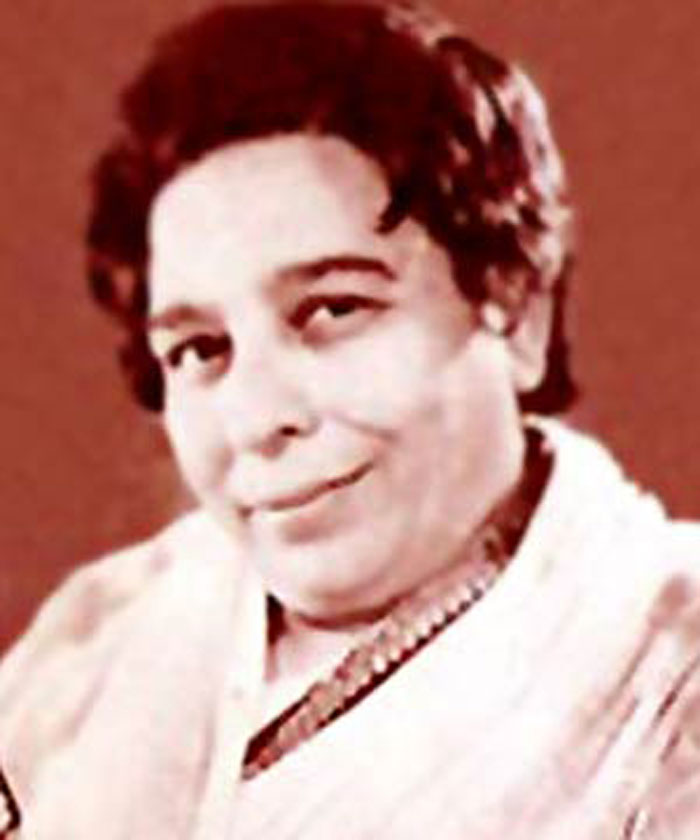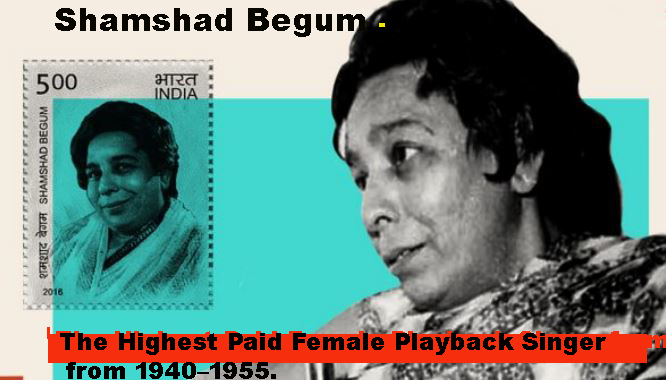
Shamshad Begum was married to Ganpat Lal Batto who died in 1955. The same year, she also received the OP Nayyar award for her contribution to the world of film music. In 2009, Shamshad Begum received the Padma Bhushan, India's third-highest civilian honour. In fact in the latter, she sang not for Babita, the heroine, but for the hero Biswajeet in drag and still made her mark. While many of these songs in remixed avatars are today's chartbusters, the all time super-hit, remixed in five versions already is Kajra mohabbat wala (Kismat).

Some of her evergreen hits include Hindi cinema's most-loved songs from the 40s and 50s like the first Western song ever, Meri Jaan Sunday ke Sunday, Leke pehla pehla pyaar (CID), Mere Piya gaye Rangoon (Patanga), Kabhi aar kabhi paar (Aar Paar), Saiyyan dil mein aana re (Bahaar), Boojh mera kya naam re?(CID), Kahin pe nigahein (CID), O gaadi waale gaadi dheere haak re (Mother India). To charm music lovers like this for over seven decades with very little formal training, speaks volumes of her formidable inherent talent. She could be the voice of the village belle, the vamp or the heroine or her mother with equal ease."Īccording to him, "Her voice and style were so distinctly different that despite the presence of stalwarts like Amirbai Karnataki, Lata Mangeshkar and Asha Bhosle she could hold her own and commanded a mass fan following. "Unlike the Mangeshkar sisters whose voices were more suited for the sati savitri characters that female leads represented, Shamshad Begum's voice had no such fetters. Others historians like Mukund Joshi admit that her signature voice made a big difference. When Ghulam Haider moved from Lahore to Mumbai, Shamshad Begum went with his team. These frequent broadcasts on AIR Lahore, saw music directors lining up at her door with offers. While the legend made her singing debut on Peshawar Radio on December 16, 1947, she was soon singing for All India Radio as part of Delhi's Crown Imperial Theatrical Company of Performing Arts. Shamshad Begum's earliest film songs were in Ghulam Haider's Khazanchi (1941) and Khandaan (1942). She learned briefly under the tutelage of sarangi maestro Ustad Hussain Bakshwale Saheb and composer Ghulam Haider (who also gave Lata Mangeshakr her break). In fact through the 30s and 40s she was the highest paid singer earning a princely Rs12.50 per song. The response to the 13-year-old's singing led to her being signed by a record company for whom she recorded 200 non-filmi songs over nearly a decade. "This young singer who would later prove lucky for music composers Naushad, OP Nayyar and Shankar-Jaikishan and lyricists Sahir Ludhianvi and Majrooh Sultanpuri was known for standing away from the microphone while singing because of her powerful voice." "But once she began singing the throw of her voice had everyone enthralled," says music historian Mukund Jha. When a young Shamshad first sang at a Lahore concert, she had to be picked up so that she could reach the mike.


A promise, that meant that her first photographs could only be clicked after a lot of persuasion in the 70s, though her voice was already well known. A promise that she would never face the camera helped her in getting their approval to record.
#SHAMSHAD BEGUM SONGS MOVIE#
"Where was the film industry which calls itself a big family and rallies around the rich and powerful, when she was suffering and was all but forgotten?" she asked.īorn in Amritsar, on April 14, 1919, this movie buff was such an ardent fan of KL Saigal that she by her own admission in an AIR interview in the 80s, admitted watching Devdas 14 times! Despite her deep desire to be an actor, she found formidable opposition from her conservative parents. "Though her songs are on everybody's lips she lived and died unsung," lamented a saddened family friend. Advanced age added to her health complications and she breathed her last on Tuesday night."įor someone whose songs are chartbuster remixes, to which generation Y grooves, the funeral in the early hours of Wednesday was a very simple affair with only a handful attendees. Her daughter Usha Ratra, 71 told DNA, "She'd been unwell and was admitted in hospital for the past few months. Barely 10 days after her 94th birthday, Bollywood's first playback singer breathed her last after a prolonged battle with ill-health and complications at a Powai hospital in Mumbai.


 0 kommentar(er)
0 kommentar(er)
